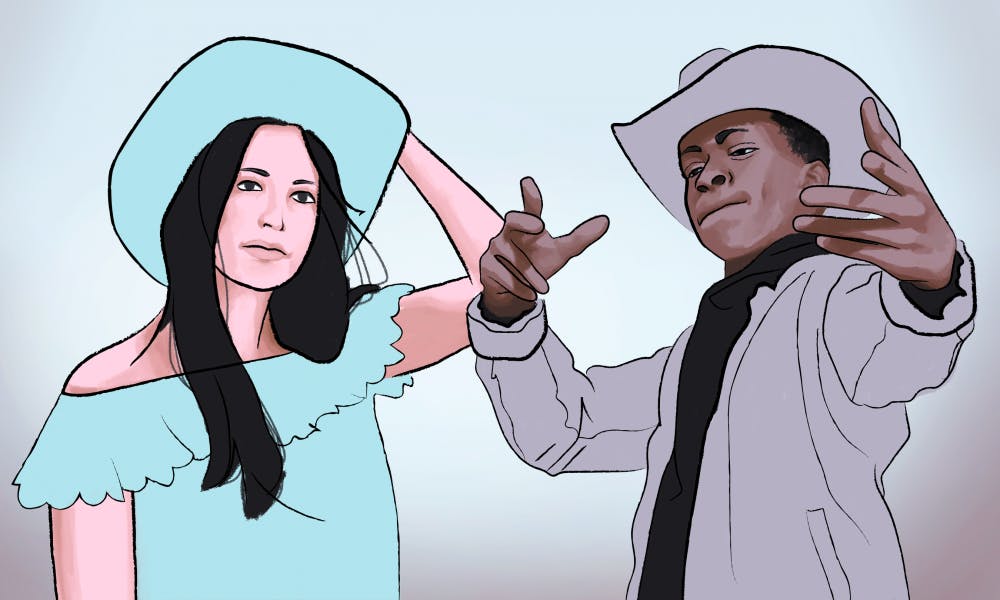While at karaoke just the other day, my friends and I sang our way through everything from Maroon 5 to My Chemical Romance, but the song selection that shocked me most was ending on John Denver's "Country Roads," a country classic about West Virginia, Blue Ridge Mountains, and the Shenandoah River.
A diverse group of six college students, many of whom I'm sure have scoffed at country at some point in their lives, naturally came to singing along to a country staple. I have recently come to love country, and I didn't even try to convince them to pick this song. So why would I hear the phrase so often growing up, "I will listen to anything but country," when so clearly even the most country country song is revered as a classic?
Let's begin by asking what a country song even is. Lil Nas X made everyone reconsider the meaning of country with his blend of country and trap music on the song "Old Town Road." Although the track originally made it onto Billboard's Hot Country charts, that position was removed by Billboard, which stated that, "Determining which chart a song lives on is an ongoing process that depends on a number of factors, most notably the song’s musical composition, but also how the song is marketed and promoted, the musical history of the artist, airplay the song receives, and how the song is platformed on streaming services." The song then made it to #1 on the overall Billboard Hot 100.
Kacey Musgraves similarly challenged the definition of country with her album Golden Hour, which fused pop, disco, and country into one of 2018's best albums. Recently performing at Coachella, her place in the pop ethos is unquestionable, but most people don't think of Musgraves when they think of country.
This hatred for country isn't based in actual popularity—there is clearly a space for country in popular culture—so is this a question of definitions? When one thinks of a typical country song, one thinks about a straight white man singing in a Southern drawl about his truck, his gun, his whiskey, and his wife. But does that represent the typical country song?
Sure, many popular country songs may be that stereotypical (see: "She Thinks My Tractor's Sexy" by Kenny Chesney), but country music has always been built on representation of the working class. Dolly Parton's "9 to 5" represents this best, with lyrics like "Barely gettin' by, it's all takin' and no givin'" and "Waitin' for the day your ship'll come in/An' the tide's gonna turn and it's all gonna roll your way." It's no surprise the song is now inspiring memes.
So, is this then a question of demographics? Like I said, many imagine the typical country singer–songwriter as a straight white man. While country is not known for its diversity and inclusivity, it is a genre that has a thriving community of women and people of color. Musicians like Margo Price and Brandi Carlile lead the most recent iteration of women in country, while artists like Rhiannon Giddens and Alynda Segarra of Hurray for the Riff Raff are women of color making waves, but often left out of discussions of the genre.
So, what exactly drives this distaste for country among our generation of college students? It can be a combination of any of these factors, with the addition of biases among country radio disc jockeys who play the most generic music for their audience, rather than take a chance on the underrepresented artists and instead skewing our perception of the genre.
Only with the rise of streaming has further exploration of country become possible, not only giving fans a chance to learn about any genre late in life, but also encompassing a huge span of artists in little time. Previously, finding a new, exciting artist took time and money spent at record shops. Now, the record shop costs five bucks a month and comes with Hulu thrown in.
What can be done, then? If you yourself have ever been guilty of claiming that you'll "listen to anything but country," it comes down to you to think about what it is you dislike about the genre. It's a diverse, working class genre that's built on the struggle of average Americans to get by. It's built around picking up an instrument, learning a few chords, and singing what's in your heart. It's built around storytelling, sharing songs, and reveling in your ups as well as your downs.
So take some time to listen to some of country's less appreciated (you can start with some of the artists mentioned above), keep an open ear, and try to find an artist you can connect with. Like any genre, you won't find yourself falling in love with every song, but when you can really get down to a pedal steel and upright bass, no genre can match that.







